Table of Contents
Tryptophan is the sole precursor of serotonin. L-Tryptophan’s role in brain serotonin synthesis is critical for mood, behavior and cognition.
Serotonin is often referred to as the “happiness molecule”. Low serotonin levels can result in pain, insomnia, depression, seasonal affective disorder, and chronic fatigue.
For your body to manufacture serotonin, it needs an adequate supply of the natural amino acid Tryptophan. As a nootropic supplement, Tryptophan is used for anxiety, ADHD, depression, insomnia, memory loss, pain, and eating disorders.[i]
A lack of bioavailable Tryptophan in your body can have a big impact on your life.
Tryptophan helps:
- Anxiety & Mood. Tryptophan is an essential amino acid needed to synthesize serotonin which plays a role in mood, sleep, learning and even appetite control.
- ADHD. Low levels of Tryptophan and serotonin imbalances in the brain are associated with ADHD. Studies have found that children with ADHD have 50% lower than average levels of Tryptophan.[ii]
- Neurotransmitters. Low levels of Tryptophan can result in short- and long-term memory loss. Supplementing with Tryptophan has been found to improve memory in healthy adults.
Overview
Tryptophan is an essential amino acid and precursor to serotonin, melatonin and niacin (Vitamin B3) in your body.
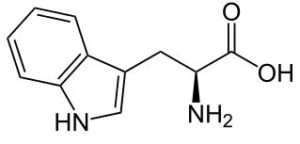
The enzyme Tryptophan hydroxylase converts Tryptophan into 5-HTP (5-hydroxytryptophan).
The decarboxylation of 5-HTP to serotonin is dependent on the presence of Vitamin B6, also called pyridoxal 5’-phosphate (P5P).
The further conversion of serotonin into melatonin requires the presence of SAM-e (S-Adenosyl-L-methionine).
Tryptophan is found in foods like oats, bananas, dried prunes, milk, tuna, cheese, bread, chicken, turkey, peanuts and chocolate.
Eating food containing Tryptophan will increase levels of this amino acid in your body. But not necessarily boost serotonin levels in your brain. Here’s why…
Tryptophan is one of 8 essential amino acids and has the lowest concentration in the body of all the amino acids. Tryptophan requires and competes for active transport to the brain. And competes for the same receptors as the other amino acids.
Research has also found that serotonin levels are enhanced by carbohydrates in your meals because insulin release accelerates the serum removal of some of the amino acids that Tryptophan is competing with.
And if your meal has a higher percentage of proteins, it also slows serotonin elevation in your brain.[iii]
Since Tryptophan from food has issues working its way to your brain to make serotonin, why not skip that step and supplement with 5-HTP instead? Tryptophan and 5-HTP both penetrate the blood-brain barrier. And 5-HTP is the intermediate step in serotonin synthesis.
See my post on 5-HTP for more on why supplementing with 5-HTP instead of Tryptophan is not such a good idea.
How does Tryptophan work in the Brain?
Tryptophan boosts brain health and function in several ways. But two in particular stand out.
- Tryptophan boosts memory. Tryptophan’s main nootropic mechanism of action is as a precursor to the neurotransmitter serotonin. Other neurotransmitters such as melatonin and beta-endorphin increase following Tryptophan supplementation.[iv]
Research shows that Tryptophan and serotonin play a significant role in memory. Enhanced brain serotonin has been shown to improve cognitive performance in animals and humans. And decreasing levels of serotonin through Tryptophan depletion impairs cognition.
A study done in Pakistan assessed memory in rats following Tryptophan administration. The rats received Tryptophan doses of 50 and 100 mg/kg of body weight for 6 weeks. The study showed significant improvement in memory of rats following both doses of Tryptophan.[v]
- Tryptophan enhances mood. As a precursor to serotonin, Tryptophan can have a significant effect on mood. Supplementing with Tryptophan has been found to increase not only serotonin, but growth hormone and prolactin as well.
Researchers infused 11 healthy male subjects with doses of 5, 7.5 and 10 grams of Tryptophan. And then monitored their hormonal and behavioral responses.
Tryptophan produced significant effects on mental and physical sedation but did not increase levels of tranquilization. Tryptophan provided a calming effect without knocking these guys out even at high doses.[vi]
How things go bad
As we get older, our brain chemistry and energy metabolism changes.
↓ Tryptophan levels decline
↓ Tryptophan hydroxylase levels decline
↑ Stress, insulin resistance and age increase
↓ Magnesium and Vitamin B6 levels decline
↓ Neurotransmitter levels decline
↓ Concentration, working memory and executive function decline
↓ Appetite regulation, energy and alertness decline
All of these changes can happen at an age. And are influenced by declining Tryptophan levels. Very little dietary Tryptophan is available for protein and serotonin synthesis. And for many people this can be a problem.
Anxiety, depression, ADHD, memory loss, binge eating and a host of other mental and physical issues have been correlated with low Tryptophan levels.
Tryptophan benefits
Just living in our modern society seems to leave us irritable, stressed-out, and anxious. Worst case is problems sleeping, depression, aggressive behavior, reduced motivation, pain and even suicidal thinking.
 And all have been traced to not enough serotonin in our brain.[vii]
And all have been traced to not enough serotonin in our brain.[vii]
Serotonin, the happiness molecule relies on an adequate supply of Tryptophan for synthesis. Researchers now recognize that the role serotonin plays in psychiatric and behavior disturbances comes from Tryptophan depletion.[viii]
Tryptophan hydroxylase is the rate-limiting enzyme needed for serotonin production. And is involved in the conversion of Tryptophan to 5-HTP (5-Hydroxytryptophan) needed to make serotonin.
This enzyme (Tryptophan hydroxylase) can be inhibited by stress, insulin resistance, magnesium or Vitamin B6 deficiency, or increasing age.
Tryptophan and 5-HTP can penetrate the blood-brain barrier. But Tryptophan requires active transport and competes for the same receptors with other amino acids including tyrosine, phenylalanine, valine, leucine, and isoleucine.[ix]
To complicate things even more, serotonin levels are enhanced by carbohydrates in our diet because insulin release accelerates serum removal of the amino acids competing for Tryptophan transport. And high levels of protein in our diet slows increase in serotonin.[x]
So now you know why it’s helpful to add supplemental L-Tryptophan to your nootropic stack.
How does Tryptophan feel?
Many try L-Tryptophan the first time to cure insomnia or as an alternative to prescription sleep meds.
Dosing L-Tryptophan in the evening will typically ensure you’ll feel great the next day. You should have more energy for working out.
Anxiety levels should decrease. Happiness levels should rise. Tryptophan could help with memory. Music will sound better. Feelings of self-esteem will improve.
Some neurohackers report being able to taper off prescription antidepressant meds by supplementing with L-Tryptophan.
Tryptophan Clinical Research
5-HTP and Tryptophan are natural alternatives for the treatment of depression. And often used as alternatives to prescription antidepressant treatments because they don’t come with the side effects associated with antidepressant drugs.
But as neurohackers we don’t have a lot of research to help us decide if supplementing with Tryptophan makes sense. (If we base our decisions on clinical trials).
Much of the research looks at finding out if low levels of Tryptophan are associated with depression and poor cognition. But there is very little clinical evidence that supplementing with Tryptophan will help reverse low Tryptophan levels. And if adding this nootropic to our stack will boost mood and cognition.
Researchers at the University of Queensland in Australia decided to comb through the research to find out if clinical trials supported the natural health claims of using 5-HTP and/or Tryptophan for depression.
The team located 108 trials of which only 2 studies involving a total of 64 people had sufficient data to qualify. The team concluded that the very limited data showed 5-HTP and Tryptophan better that placebo for alleviating depression. But that larger and more studies were needed before their widespread use could be recommended.[xi]
Low Tryptophan = Depression and Poor Cognition
20 patients in remission or partial remission from depression were studied in a double-blind, crossover design trial. Tryptophan was artificially depleted in these patients so scientists could look at the effects on cognition and mood.
The research team found what we see in real life. Lower levels of Tryptophan had a negative effect on mood, their ability to process positive information, and attention.[xii]
Tryptophan Helps Manage Depression
Serotonin has been recognized as the neurotransmitter that is key to managing depression for the last 30 years. Most of the prescription drug therapies for depression work by raising serotonin levels at the relevant synapses.
We also know that Tryptophan is the immediate precursor to serotonin in the brain. So researchers, using a “what came first, the chicken or the egg” approach decided to find out if low serotonin levels or low Tryptophan levels were to blame for depression symptoms.
Researchers in China analyzed levels of Tyrosine, Tryptophan and serotonin in patients with major depressive disorder. And found that all three were decreased in depressed patients. (Note that Tyrosine is a precursor to dopamine in the brain).[xiii]
The Center for Addiction and Health in Toronto conducted a randomized, double-blind, placebo-controlled trial with 30 depressed individuals. Treatment was fluoxetine (Prozac®) 20 mg per day, 2-4 grams of Tryptophan per day or a placebo for 8 weeks.
Mood was assessed using the Hamilton Depression Rating Scale and the Beck Depression Index during the trial. During the 1st week there was a significant decrease in depression in those who used fluoxetine or Tryptophan.
At 4 weeks the research team recorded a disruption in sleep patterns for those using fluoxetine or a placebo. But not the Tryptophan group.
The team concluded that combining 20 mg of fluoxetine with 2 g of Tryptophan was a safe protocol for treating depression. Patients experienced a rapid decrease in depressive symptoms. And the combination had a protective effect on sleep patterns.[xiv]
DO NOT TRY THIS AT HOME. The trials combining Tryptophan with SSRI’s, SNRI’s and MAOI’s are all done under professional supervision. But remember, Tryptophan is a precursor to serotonin. And antidepressant meds also boost serotonin in the brain. When combined, serotonin levels are boosted even more.
Herein lies the problem. If you increase serotonin too much, you put yourself in real danger of Serotonin Syndrome. Which can lead to all kinds of nasty side effects. Including death.[xv]
DO NOT combine Tryptophan with antidepressant meds unless you are doing so under the careful supervision of a doctor. It is much too dangerous attempting this on your own.
Tryptophan Boosts Exercise Performance
Ever wondered why you cut a workout session short even though physical fatigue wasn’t an issue? Researchers found it could be due to low Tryptophan levels. And its effects on serotonin in your brain.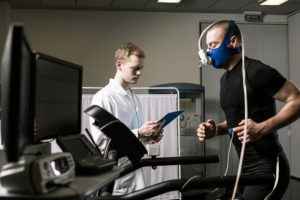
20 healthy young men aged 21 years used a cycle ergometer at about 50% of their physical capacity for 10 minutes followed by maximum intensity exercise for another 30 minutes. This sequence was repeated 3-times, and after the 4th series, each participant continued at the highest speed they could sustain for 20 minutes.
This protocol was performed twice: once with and once without Tryptophan. Researchers found peak power output during the last 20 minutes were higher on trials performed with Tryptophan than those who performed on a placebo.[xvi]
Another trial in Spain recruited 12 healthy sportsmen who ran on a treadmill until exhaustion. Once while supplementing with Tryptophan and once with a placebo.
Total exercise time, perceived exertion rate, maximum heart rate, peak oxygen consumption, pulse recovery rate, and excess post-exercise oxygen consumption were determined during the two trials.
Total exercise time was nearly 50% greater after receiving Tryptophan than after receiving a placebo. Perceived exertion rate was lower when using Tryptophan.
The researchers concluded that the longer exercise time could be due to increased pain tolerance as a result of Tryptophan supplementation.[xvii]
Tryptophan Relieves Symptoms of Seasonal Affective Disorder
Seasonal Affective Disorder (SAD) is a form of depression experienced by many during the winter months. Symptoms include difficulty waking, decreased energy, weight gain, carbohydrate craving, difficulty concentrating, decreased libido, withdrawal, anxiety, depression and irritability.
The first order of treatment is often light therapy. But many do not respond to light therapy typically because of a mutation in the melanopsin gene and the associated signaling pathway between the retina and the pineal gland.[xviii]
The pineal gland in your brain is your source of melatonin which influences sleep cycles. Melatonin is synthesized from serotonin which is synthesized from Tryptophan.[xix]
So if light therapy doesn’t work, possibly supplementing with Tryptophan to stimulate production of serotonin and melatonin could be effective.
Researchers at the University of British Columbia in Vancouver, Canada set out to find if Tryptophan could help those with Seasonal Affective Disorder (SAD) where light therapy failed.
Patients were treated for 2 weeks using light therapy. Those who did not respond to light therapy were treated with 1 g Tryptophan 3-times per day for 2 weeks while continuing light therapy.
The addition of Tryptophan resulted in a significant reduction in depression. 64% of the patients in this study showed very good clinical responses to the combined treatment with minimal side effects.[xx]
Tryptophan Recommended Dosage
Recommended dosage of Tryptophan is 500 – 1,000 mg per day for cognitive benefit.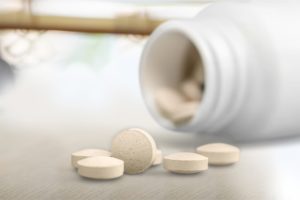
The University of Michigan Health Department recommends much higher doses for:
- Lowering appetite and cravings: .5 – 2 grams per day
- Depression or Anxiety: 2 – 6 grams per day (with medical supervision)
- Chronic pain or migraines: 2 – 4 grams per day in divided doses
- Sleep disorders or insomnia: 1 – 2 grams at bedtime[xxi]
Tryptophan is a precursor to the neurotransmitter serotonin in the brain. Tryptophan hydroxylase is the rate-limiting enzyme needed for serotonin production. And requires magnesium and Vitamin B6 to synthesize serotonin.
Tryptophan is also a precursor to the synthesis of Vitamin B3 (niacin). So if you don’t have enough niacin in your body, supplementing with L-Tryptophan will not efficiently produce serotonin because it’s being used to produce niacin. Which also depletes stores of the vitamin cofactors B1, B2 and B6.
So supplement L-Tryptophan with a B-Vitamin complex that includes Vitamins B3 and B6, and magnesium.
Note that some of the clinical trials used in this post use much higher doses of Tryptophan. Which is not recommended and usually not necessary.
Too much Tryptophan will make you sleepy. And could produce excess levels of 5-HTP and serotonin which can lead to Serotonin Syndrome.
Tryptophan Side Effects
Tryptophan is a normal part of your diet and considered non-toxic and safe at recommended doses.
But in the unlikely event that you already have adequate levels of Tryptophan in your body, supplementing with more could cause problems. As can dosing more that the recommended amount.
Tryptophan could cause stomach upset, loss of appetite, nausea, heartburn, drowsiness, headaches, dry mouth and sexual problems.
Start at the lowest dose to see how your body reacts. When first starting with L-Tryptophan take your dose in the evening to avoid possible drowsiness issues.
Caution: Low to moderate doses of Tryptophan (30 mg per pound of body weight), or about 4.5 grams for the average 165 lb. adult is considered safe and free of side effects. However, most don’t need to dose at nearly these levels.
DO NOT use L-Tryptophan if you are taking antidepressant medications including SSRI’s. Because these drugs delay normal degradation of serotonin in brain synapses leaving more serotonin circulating in your brain.
Too much Tryptophan in combination with these drugs can produce Serotonin Syndrome which can lead to delirium, involuntary muscle contractions, high fever, and coma. And worse case and a very real scenario is death.[xxii]
Type of Tryptophan to buy
L-Tryptophan is available in tablet and capsule form usually 500 – 1,000 mg.
You also get Tryptophan in foods you eat including chocolate, oats, bananas, dried dates, milk, cottage cheese, meat, fish, turkey, and peanuts.
Approximately 300 mg of Tryptophan is available in three ounces of turkey, lamb, beef, tuna, or peanuts. Fortunately, relative to other amino acids, small amounts are needed for a therapeutic effect.
And you get 200 mg L-Tryptophan in Performance Lab® Sleep which also contains 100 mg magnesium (as Magnesium Bisglycinate, Magnesium Taurate, & NutriGenesis® Magnesium) and 500 mg Montmorency Tart Cherry (as CherryPURE®).
But there are all kinds of reasons why your body may not be making good use of the Tryptophan you’re getting from food. See “Tryptophan Benefits” for more on why it may be a good idea for you add Tryptophan to your stack.
Nootropics Expert Recommendation
Tryptophan 500 – 1,000 mg per day
 I recommend using Tryptophan as a nootropic supplement.
I recommend using Tryptophan as a nootropic supplement.
Your body does get some Tryptophan from the food you eat. But this amino acid is competing with other amino acids for transport to your brain. It’s competing for the same receptors. And carbohydrates vs. proteins in your meals can affect Tryptophan’s ability to synthesize serotonin in your brain.
Supplementing with L-Tryptophan will make more of this amino acid available to synthesize serotonin and melatonin.
L-Tryptophan is especially helpful for those with low serotonin levels. Boosting this crucial neurotransmitter can help alleviate insomnia, pain, depression and anxiety.
Start with 500 mg of L-Tryptophan per day and take it in the evening. See how your body reacts and how you feel the next day. Increase the dose to no more than 2 grams per day as needed. And watch for side effects.
L-Tryptophan requires adequate levels of Vitamin B3, B6 and magnesium for serotonin synthesis. So add a good B-Complex vitamin and magnesium to your stack when using L-Tryptophan.
And if you’re dealing with insomnia, consider trying Performance Lab® Sleep which contains 200 mg L-Tryptophan.

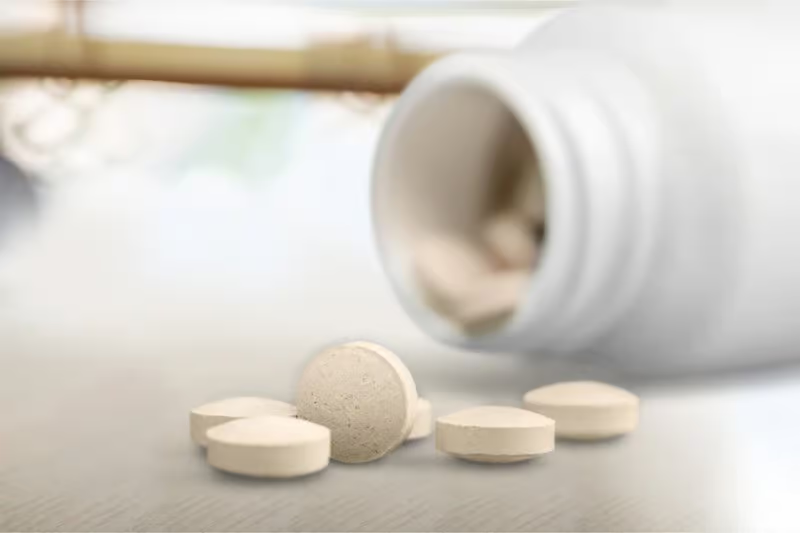
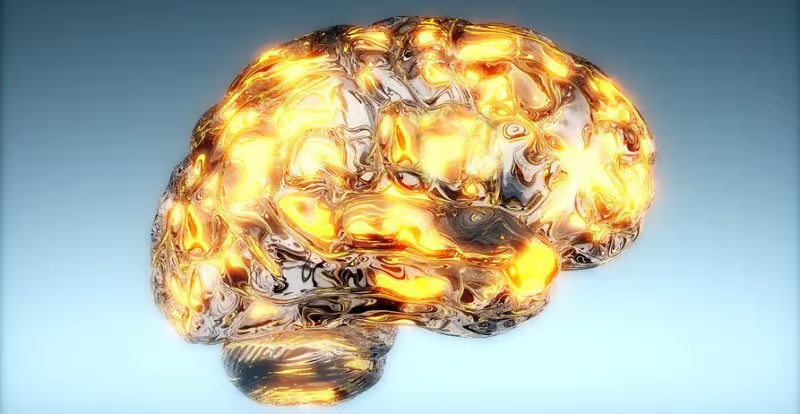






Join The Discussion - 378 comments
Jman
April 17, 2022
Hello
I take L-tyrosine or DLPA (500 mg) and L-tryptophan (500 mg). Would adding Fenugreek cause any interactions with those?
David Tomen
April 18, 2022
Jman, it shouldn’t cause any problems. Fenugreek works primarily on glucose uptake.
Benjamin
April 4, 2022
Hi David! What do you think about PharmaTryptophan™?
I use 500mg of normal cheap tryptophan right now. Does fermentation process matter?
David Tomen
April 4, 2022
Benjamin, all Tryptophan supplements are manufactured by fermentation by several different types of bacteria. The same bacteria you’d find naturally in your gut.
The benefit of using patented forms of supplements is you are usually assured that what’s on the label is what’s in the bottle. Because the supplement maker pays a much higher licensing fee to the manufacturer to use that patented substance.
But supplement company reputation is important because there is a lot of adulterated supplements out there. On the other hand, it’s harder to sell fakes labeled as the patented form because the market is closely watched by the company who holds the patent.
Gordan
March 18, 2022
Hello David. I hope you are well. Can you take l tryptophan for sleep if you are insulin resistant? If not, what would be the alternative? Thank you in advance. Regards Gordan
David Tomen
March 18, 2022
Gordan, I personally use L-Tryptophan for sleep and was diagnosed insulin resistant a couple of years ago. I am no longer insulin resistant because I started supplementing with Berberine twice per day.
Studies how that those who were insulin resistant had higher levels of Tryptophan in their system (https://www.ncbi.nlm.nih.gov/labs/pmc/articles/PMC5012675/). That is not to say Tryptophan “caused” insulin resistance. Only that it was higher compared to ‘healthy’ people. Notice in that 2nd last paragraph of that study that you can normalize Tryptophan levels by supplementing with Tyrosine which increases dopamine. This will stabilize the Tryptophan/Tyrosine ratio.
And this study (https://www.ncbi.nlm.nih.gov/labs/pmc/articles/PMC3779535/) showed that those who were insulin resistant were deficient in Vitamin B6 which is a cofactor in serotonin synthesis. This can be corrected by supplementing with P-5-P which is the natural form of Vitamin B6.
Gordan Stankovski
March 21, 2022
Hello David.Sorry about the delayed reply.Thanks a lot for your answer.Regards Gordan
Patti
March 15, 2022
David,
I know you do not recommend really high doses of L-Tryptophan according to this thread, but I read an article in Pyschology Today (2017) where this doctor (An Integrative Physician) was recommending very high doses for severe insomnia which is what I have. His initial dose was 15 grams the first night. Anyway, since mine is crippling and I have been on SSRI’s, benzodiazepines (this being the last thing I was on) and now off (once off for 6 months, had to go back on because of the horrific insomnia and totally off again for 3 months of benzodiazepines) I now find myself in the same boat, I’m sure it’s protracted withdrawal. Started taking 4 grams of Tryptophan, worked fairly well, increased to 5 grams, worked even better (at night only). This great streak went on for about 3 months and I was happy and rested for the first time in a long time, until it just stopped working. I read also in this thread that I should have been taking a dopamine precursor (Tyrosine) in the am to balance things out, which I have just started. I’m only taking 250 mg of that though, because I’m so afraid of it stimulating me too much and making the insomnia even worse, if that’s even possible. My Psychiatrist is aware of the high dosing of Typtophan and supports it. I have no symptoms of Serotonin syndrome. Could this be only because of the push in
serotonin and nothing to help the dopamine?? I literally have zero symptoms from taking the high doses of Tryptophan at night.
David Tomen
March 17, 2022
Patti, you are correct that it very likely stopped working because you upset your serotonin/dopamine balance. And common sense would tell you that a really high dose of L-Tryptophan like you are using would not be supported by only 250 mg L-Tyrosine. It’s not possible.
Patti
March 24, 2022
Thank you. I am now taking 500mg of Tyrosine. Once this is tolerated, I am going to try 2 capsules (taken separately but finishing before noon) for a total of 1000 mg in the am. Do you have any suggestions as to how high I should go to begin to correct the imbalance? I am off the typtophan (for the most part) right now
David Tomen
March 25, 2022
Patti, most adults need 500 mg L-Tyrosine twice per day. Morning and noon. But if you are using this long-term you may want to add 500 mg L-Tryptophan before bed. Because dopamine and serotonin must be in balance.
Patti
March 26, 2022
Thank you David, I’m going to work up to do just that.
Kerry
February 22, 2022
I just got tryptophan 500MG and Glycine 500MG and I’m going to take with L-theanine 200mg however the tryptophan I’m weary of as I eat a lot of dairy food throughout the day this isn’t going to be an issue is it? I am NOT on any sort of SSRI or anything how hard is serotonin syndrome
what time frame before bed should I take all 3?
David Tomen
February 22, 2022
Kerry, as long as you are not using SSRIs you’ll be fine. That combo will NOT cause Serotonin Syndrome.
Kerry
February 24, 2022
I read on google that taking tryptophan supplements is not good long-term how true is this?
David Tomen
February 24, 2022
Kerry, I don’t know how many times I have to say this but do NOT believe everything you find on Google. Or any website for that matter. Read this review from top to bottom and click through to every peer-reviewed clinical study I point to in this article.
You get Tryptophan from food, you have beneficial bacteria in your gut that produce Tryptophan, and if you did not have any Tryptophan you would have been dead long ago.
Sorry if this seems like a rant. Because it is. You can use L-Tryptophan every single day for the rest of life and you will be better for it.
Muneeb Mohiuddin
January 31, 2022
I was taking L Tryptophan in the night 10 min before dinner, I use to not eat anything for 6 hours after lunch so that Tryptophan should not compete with other amino acid and get absorb in the body. I also use to take magnesium, p5p, b12, tetrahydro methyl folate along with the Tryptophan. I have observed that when ever I strictly fasted 6 hours before taking Tryptophan, I could sleep better than when ever I didn’t fasted.. also I noticed gradual reduction in sleep span, so I stoped Tryptophan after 2 months of use. ( I am cycling Tryptophan now)
Pati
December 28, 2021
Hi David
I can’t seem to find L- Tryptophan w/o other ingredients. I narrowed it down to Doctor’s Best L-Tryptophan w/TryptoPure and Zahler L-Tryptophan Purified L-Tryptophan. Which one would you choose? Is it important to have TryptoPure? Do you have another brand you’d recommend? I’m desperate to get some sleep!
David Tomen
December 28, 2021
Pati, this one is pure with no other ingredients and it is using TryptoPure: https://amzn.to/3pIfqw9
Joshua
December 12, 2021
Greetings!
Hoping you had a great Thanksgiving and are looking forward to the upcoming Holidays!
When taking a daily multivitamin, and once any existing deficiencies have been satisfied, does continuing to take the same dosage at the same time every day create steady serum levels, or is it necessary to be mindful of half-lifes, as with pharmaceutical drugs?
For example, every morning I take a once-a-day multivitamin that includes 50mg of B6 (the same formula is also available in a twice-a-day version that could alternatively been taken in the morning and then again at midday if that were a better dosing strategy).
I’m also taking 500mg tryptophan (along with 2g magnesium bisglycinate, 300mg uridine monophosphate, 150mg cdp choline, 500mg dha algal oil, and 300mcg melatonin) about an hour before bed, and knowing that B6 is a necessary cofactor, I started taking 20mg (the lowest dosage of P5P I could find) of B6 along with the tryptophan. Unfortunately I immediately started experiencing sleep disturbances such as repeatedly waking up every couple of hours.
I stopped taking the addtional B6 before bed and sleep returned to normal (the tryprophan, magnesium, ump, choline, dha, and melatonin have helped to improve my overall sleep immensely). I waited several days and tried taking the B6 before bed again, with the same sleep disturbances occurring again.
So, is the 50mg of B6 included in the multivitamin taken in the morning, enough to be a cofactor for the tryptophan taken before bedtime?
As a side topic, are there any individual vitamins or minerals that should definitely be taken in split dosages at different times of the day?
Thanking you in advance for the help, and keep up the great work you’re doing!
David Tomen
December 12, 2021
Joshua, some vitamins are fat-soluble so are stored in fat cells until your body is ready to use them. The B-Vitamins however are water soluble and the unused portion is excreted in urine.
Life gets too complicated to worry about half-lives of vitamins and minerals in my opinion. And I am sure that if you used a bioactive Multi that is dosed correctly every single day you would never be deficient if you were tested.
What I am more concerned about is the once-a-day multi you are using. Because most multivitamins use synthetic vitamins and literally ground up rock for minerals. Your body cannot convert this stuff into the type of vitamin or mineral you naturally get from food.
Your best option is to upgrade your multi to one like this: https://bit.ly/347dm5M. And you will have all the cofactors you need throughout your day and night.
Joshua
December 16, 2021
Hi David, thanks for the reply!
Although I had to make some compromises based on available formulas, I carefully chose the multivitamin I’m taking to ensure it includes bioactive B vitamin forms based on your recommendations, e.g.:
B1 = Benfotiamine, 100mg
B2 = R5P, 50mg
B3 = Inositol Hexanicotinate, 100mg
B5 = Pantethine, 50mg
B6 = P5P. 50mg
B9 = Metafolin, 800mg
B12 = Methylcobalamin, 1000mg & Adenosylcobalamin, 500mg
Based on your reply, these dosages should be sufficient regardless of whether taken once-a-day, or split dosed twice-a-day.
What surprised me was that taking an additional 20mg of P5P along with my nighttime supplements resulted in sleep distrubances, that was very much unexpected. Of course I’ve since stopped taking the additional P5P.
I had also considered adding a small amount of zinc and niacin along with the additional P5P, but have since backed off that idea, at least for now.
Any insight as to what may have caused the sleep disturbances?
Thanks!
David Tomen
December 16, 2021
Joshua, is the amount of B12 you listed accurate? i.e. 1000 mg and 500 mg. Because if it is way overdosed. And folate at 800 mg is way overdosed as well. Both of those B-Vitamins are dosed in mcg and not mg.